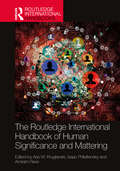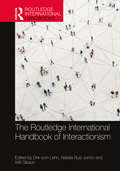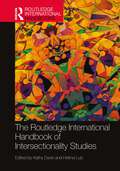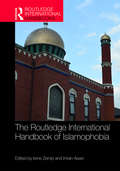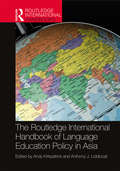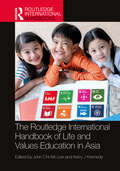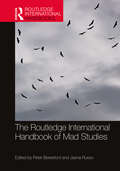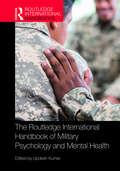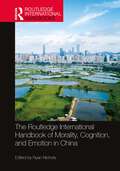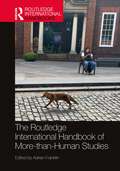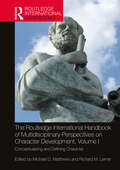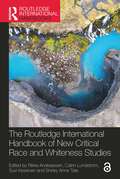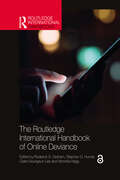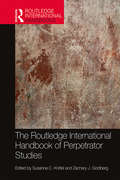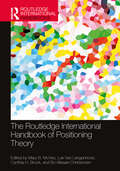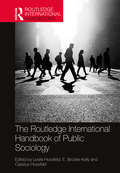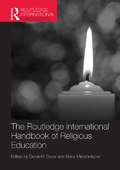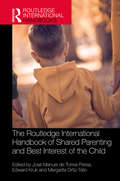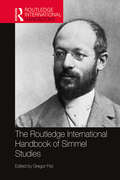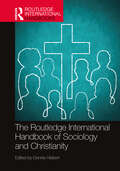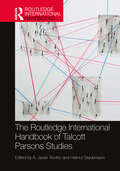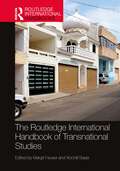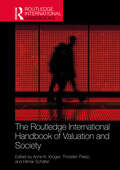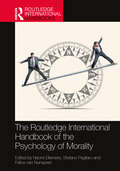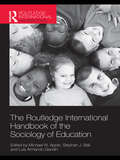- Table View
- List View
The Routledge International Handbook of Human Significance and Mattering (Routledge International Handbooks)
by Isaac Prilleltensky Arie W. Kruglanski Amiram RavivThis innovative book addresses the need for significance and mattering as a universal human motivation. It examines the impact of significance and mattering, considering how they manifest across our lifespan and in different parts of our lives.Written by a team of eminent authors with expertise in diverse psychological fields, the book explores how significance and mattering extend to almost all social domains, including families, schools, colleges, groups, workplaces, communities, and nations. The book is divided into four main parts, which consider the impact of significance and mattering across the life span, across life domains, across societies and cultures, and in mental health. The chapters outline how significance and mattering power race and gender politics, shape attitudes toward immigration, drive violent extremism, and underlie mental health issues, such as loneliness, and narcissism. The book considers the quest for significance as a fundamental motive in our personal interactions and in how society operates as a whole.Providing a truly comprehensive coverage of a ubiquitous psychological dynamic that affects all aspects of our lives, this book will be highly relevant for researchers, academics, practitioners, and students in psychology, social sciences, education, social work, and therapeutic professions. In addition, the book should appeal to organizational, political, and community leaders and the general public interested in human behavior and social problems.
The Routledge International Handbook of Interactionism (Routledge International Handbooks)
by Dirk vom Lehn; Natalia Ruiz-Junco; Will GibsonThe Routledge International Handbook of Interactionism demonstrates the promise and diversity of the interactionist perspective in social science today, providing students and practitioners with an overview of the impressive developments in interactionist theory, methods and research. Thematically organized, it explores the history of interactionism and the contemporary state of the field, considering the ways in which scholars approach topics that are central to interactionism. As such, it presents discussions of self, identity, gender and sexuality, race, emotions, social organization, media and the internet, and social problems. With attention to new developments in methods and methodologies, including digital ethnography, visual methods and research ethics, the authors also engage with new areas of investigation that have emerged in light of current societal developments, such as policing and police violence, interactionism beyond binaries and social media. Providing a comprehensive overview of the current state and possible future of interactionist research, it will appeal to interactionist scholars, as well as to established sociologists and students of sociology who have an interest in latest developments in interactionism.
The Routledge International Handbook of Intersectionality Studies (Routledge International Handbooks)
by Helma Lutz Kathy DavisIntersectionality is one of the most popular theoretical paradigms in gender studies and feminist theory today. Initially developed to explore how gender and race interact in the experiences of US women of colour, it has since been taken up in different disciplines and national contexts, where it is used to investigate a wide range of intersecting social identities and experiences of exclusion and subordination. This volume explores intersectionality studies as a burgeoning international field with a growing body of research, which is increasingly drawn upon in policy, political interventions, and social activism. Bringing together contributors from different disciplines and locations, The Routledge International Handbook of Intersectionality Studies maps the history and travels of intersectionality between continents and countries and takes up debates surrounding the privileged role of race in intersectional analysis, the ways in which intersectional analysis should or should not be carried out, and the political implications of thinking intersectional analysis and thought. Opening up new avenues of enquiry for a future generation of scholars and practitioners, it will appeal to scholars of sociology, gender studies, politics, and cultural studies with interests in feminist thought, social identity, social exclusion, and social inequality.
The Routledge International Handbook of Islamophobia (Routledge International Handbooks)
by Imran Awan Irene ZempiIslamophobic hate crimes have increased significantly following the terrorist attacks of 9/11 and 7/7. More recently, the rhetoric surrounding Trump’s election and presidency, Brexit, the rise of far-right groups and ISIS-inspired terrorist attacks worldwide have promoted a climate where Islamophobia and anti-Muslim sentiments have become ‘legitimised’. The Routledge International Handbook of Islamophobia provides a comprehensive single-volume collection of key readings in Islamophobia. Consisting of 32 chapters accessibly written by scholars, policy makers and practitioners, it seeks to examine the nature, extent, implications of, and responses to Islamophobic hate crime both nationally and internationally. This volume will appeal to undergraduate and postgraduate students as well as postdoctoral researchers interested in fields such as Criminology, Victimology, Sociology, Social Policy, Religious Studies, Law and related Social Sciences subjects. It will also appeal to scholars, policy makers and practitioners working in and around the areas of Islamophobic hate crimes.
The Routledge International Handbook of Language Education Policy in Asia (Routledge International Handbooks)
by Andy Kirkpatrick Anthony J. LiddicoatThis must-have handbook offers a comprehensive survey of the field. It reviews the language education policies of Asia, encompassing 30 countries sub-divided by regions, namely East, Southeast, South and Central Asia, and considers the extent to which these are being implemented and with what effect. The most recent iteration of language education policies of each of the countries is described and the impact and potential consequence of any change is critically considered. Each country chapter provides a historical overview of the languages in use and language education policies, examines the ideologies underpinning the language choices, and includes an account of the debates and controversies surrounding language and language education policies, before concluding with some predictions for the future.
The Routledge International Handbook of Life and Values Education in Asia (Routledge International Handbooks of Education)
by John Chi-Kin Lee Kerry J KennedyThis Handbook provides a comprehensive look at the educational scope of life and values that characterize 21st-century Asia, as well as those values shared across cultures.Some values are deeply resonant with the region’s past while others reflect modernity and the new contexts in which Asian societies find themselves. Exploring these values of different types and the way they are constructed in Eastern and Western contexts, the contributors delve into the diversity of religious, moral and social education to promote greater understanding across cultures. While a range of values is identified here, there is no single set of values that can be applied to all people in all contexts. The time has long gone, even for single societies, when values can be imposed. Yet this Handbook emphasizes both the extent and importance of values to individuals and their societies—how they respond to these values may provide the key to better and more caring societies and to better lives for all.Academics and teachers will find this Handbook resourceful because it raises important theoretical issues related to social values and their formation in distinctive contexts and provides novel insights into the diverse educational landscape in Asia. Policymakers and educators will also find this text helpful in learning to think about new ways to improve the quality of people’s lives.
The Routledge International Handbook of Mad Studies (Routledge International Handbooks)
by Peter BeresfordBy drawing broadly on international thinking and experience, this book offers a critical exploration of Mad Studies and advances its theory and practice. Comprised of 34 chapters written by international leading experts, activists and academics, this handbook introduces and advances Mad Studies, as well as exploring resistance and criticism, and clarifying its history, ideas, what it is, and what it can offer. It presents examples of mad studies in action, covering initiatives that have been taken, their achievements and what can be learned from them. In addition to sharing research findings and evidence, the book offers examples and insights for advancing understandings of experiences of madness and distress from the perspectives of those who have (had) those experiences, and also explores ways of supporting people oppressed by conventional understandings and systems. This book will be of interest to all scholars and students of Mad Studies, disability studies, sociology, socio- legal studies, mental health and medicine more generally.
The Routledge International Handbook of Military Psychology and Mental Health (Routledge International Handbooks)
by Updesh KumarMilitary psychology has become one of the world’s fastest-growing disciplines with ever-emerging new applications of research and development. The Routledge International Handbook of Military Psychology and Mental Health is a compendium of chapters by internationally renowned scholars in the field, bringing forth the state of the art in the theory, practice and future prospects of military psychology. This uniquely interdisciplinary volume deliberates upon the current issues and applications of military psychology not only within the military organization and the discipline of psychology, but also in the larger context of its role of building a better world. Split into three parts dedicated to specific themes, the first part of the book, "Military Psychology: The Roots and the Journey," provides an overview of the evolution of the discipline over the years, delving into concepts as varied as culture and cognition in the military, a perspective on the role of military psychology in future warfare and ethical issues. The second part, "Soldiering: Deployment and Beyond," considers the complexities involved in soldiering in view of the changing nature of warfare, generating a focal discourse on various aspects of military leadership, soldier resilience and post-traumatic growth in the face of extreme situations, bravery and character strengths and transitioning to civilian life. In the final section, "Making a Choice: Mental Health Issues and Prospects in the Military," the contributors focus on the challenges and practices involved in maintaining the mental health of the soldier, covering issues ranging from stress, mental health and well-being, through to suicide risk and its prevention, intervention and management strategies, moral injury and post-traumatic stress disorder. Incorporating enlightening contributions of eminent scholars from around the world, the volume is a comprehensive repository of current perspectives and future directions in the domain of military psychology. It will prove a valuable resource for mental health practitioners, military leaders, policy-makers and academics and students across a range of disciplines.
The Routledge International Handbook of Morality, Cognition, and Emotion in China (Routledge International Handbooks)
by Ryan NicholsThis ground-breaking handbook provides multi-disciplinary insight into Chinese morality, cognition and emotion by collecting in one place a comprehensive collection of essays focused on Chinese morality by world-leading experts from more than a dozen different academic fields of study. Through fifteen substantive chapters, readers are offered a holistic look into the ways morality could be interpreted in China, and a broad range of theoretical perspectives, including ecological, anthropological and cultural neuroscience. Offering a syncretic, multi-disciplinary overview that moves beyond the usual western-oriented perspective of China as a monolithic culture, research questions addressed in this book focus on morality as represented at the level of the individual, rather than at the group or institutional levels. Research questions explored herein include: What are the major contours of distinctively Chinese morality? What was the role of the ancient ecology, climate, and pathogen load in producing Chinese moral attitudes and emotions? Are ingredients of the good life in China different than ingredients of the good life elsewhere? How are children in China morally educated? How do findings from cultural neuroscience help us understand differences in the treatment of family members, or the treatment of strangers, in China and elsewhere? How do the protests in Hong Kong participate in, or stand apart from, the ongoing ethics of protest in historical China? The clear structure and accessible writing offer a rigorous assessment of the ways in which morality can be interpreted, shedding light on differences between China and Western cultures. The book also provides a timely window into Chinese forms of morality, and the pivotal role these play in social organization, family relationships, systems of government, emotion and cognition. Representing fields of study ranging from philosophy, linguistics, archaeology, history, and religion, to social psychology, neuroscience, clinical psychology, developmental psychology, and behavioral ecology, this is an essential text for students, academics, and others with wide interest in Chinese culture.
The Routledge International Handbook of More-than-Human Studies (Routledge International Handbooks)
by Adrian FranklinThis volume provides a state-of-the-art overview of the field of more-than-human studies, bringing together contemporary and essential content from leading authors across the discipline. With attention to the intellectual history of the field, its developments and extensions, its applications and its significance to contemporary society, it presents empirical studies and theoretical work covering long-established disciplines, as well as new writing on art, history, politics, planning, architecture, research methodology and ethics. An elaboration of the various dimensions of more-than-human studies, The Routledge International Handbook of More-than-Human Studies constitutes essential reading for anyone studying or researching in this field.
The Routledge International Handbook of Multidisciplinary Perspectives on Character Development, Volume I: Conceptualizing and Defining Character (Routledge International Handbooks)
by Richard M. Lerner Michael D. MatthewsDrawing from philosophy, religion, biology, behavioral and social sciences, and the arts, The Routledge International Handbooks of Multidisciplinary Perspectives on Character Development, Volumes I and II, present cutting-edge scholarship about the concept of character across the life span, the developmental and contextual bases of character, and the key organizations of societal sectors, within and across nations, that promote character development in individuals, families, and communities.This first volume, Conceptualizing and Defining Character, explores the foundations of the field by providing an array of interdisciplinary approaches to character development, including economics, education, law, literature, military science, philosophy, and many more. With contributions from international experts, Volume I brings together cutting-edge research and discusses instances of character development, including civic character, courage, fairness, forgiveness, gratitude, morality, tolerance, and thankfulness.This comprehensive publication is an essential reference for researchers and graduate students in behavioral sciences, biology, philosophy, theology, and economics, as well as practitioners leading or evaluating character education or character development programs around the world.Find Volume II: Moderators, Threats, and Contexts here: www.routledge.com/9781032172453
The Routledge International Handbook of New Critical Race and Whiteness Studies (Routledge International Handbooks)
by Shirley Anne Tate Catrin Lundström Rikke Andreassen Suvi KeskinenSince its foundation as an academic field in the 1990s, critical race theory has developed enormously and has, among others, been supplemented by and (dis)integrated with critical whiteness studies. At the same time, the field has moved beyond its origins in Anglo-Saxon environments, to be taken up and re-developed in various parts of the world – leading to not only new empirical material but also new theoretical perspectives and analytical approaches. Gathering these new and global perspectives, this book presents a much-needed collection of the various forms, sophisticated theoretical developments and nuanced analyses that the field of critical race and whiteness theories and studies offers today. Organized around the themes of emotions, technologies, consumption, institutions, crisis, identities and on the margin, this presentation of critical race and whiteness theories and studies in its true interdisciplinary and international form provides the latest empirical and theoretical research, as well as new analytical approaches. Illustrating the strength of the field and embodying its future research directions, The Routledge International Handbook of New Critical Race and Whiteness Studies will appeal to scholars across the social sciences and humanities with interests in race and whiteness.Chapter 34 of this book is freely available as a downloadable Open Access PDF at http://www.taylorfrancis.com under a Creative Commons [Attribution-Non Commercial-No Derivatives (CC-BY-NC-ND)] 4.0 license.
The Routledge International Handbook of Online Deviance (Routledge International Handbooks)
by Claire Seungeun Lee Veronika Nagy Roderick S. Graham Stephan G. HumerCovering a wide range of different online platforms, including social media sites and chatrooms, this volume is a comprehensive exploration of the current state of sociological and criminological scholarship focused on online deviance.Understanding deviance broadly, the handbook acknowledges both an objective normative approach and a subjective, reactivist approach to the topic, putting into sharp relief the distinctions between cybercrime and online deviance on the one hand, and wider concerns of online communities related to online deviance on the other. Divided into five sections, the first section is devoted primarily to scholarship about the theories and methods foundational to exploring online deviance. The second section, “Gender, Sex, and Sexuality”, presents empirical research on expressions of gender, sex, and sexuality in online spaces considered deviant. The third section, “Violence and Aggression,” highlights scholarship on types of violent communications such as hate speech and cyberstalking. The fourth section, “Communities and Culture,” describes empirical research on online communities and networks that can be described as deviant by wider society. Lastly, the fifth section, “Regional Perspectives,” highlights research in which a terrestrial location is impactful to the online phenomena studied.Providing a window into future scholarship over the next several years and acknowledging the ephemeral nature of research on digital technology, The Routledge International Handbook on Online Deviance is essential reading for students and scholars of Criminology and Sociology focused on deviant online behaviour. It will also appeal to those working in related areas within Internet/Digital Studies, Media/Communication Studies, Psychology, and Cybersecurity.
The Routledge International Handbook of Perpetrator Studies (Routledge International Handbooks)
by Susanne C. Knittel Zachary J. GoldbergThe Routledge International Handbook of Perpetrator Studies traces the growth of an important interdisciplinary field, its foundations, key debates and core concerns, as well as highlighting current and emerging issues and approaches and pointing to new directions for enquiry. With a focus on the perpetrators of mass killings, political violence and genocide, the handbook is concerned with a range of issues relating to the figure of the perpetrator, from questions of definition, typology, and conceptual analysis, to the study of motivations and group dynamics to questions of guilt and responsibility, as well as representation and memory politics. Offering an overview of the field, its essential concepts and approaches, this foundational volume presents contemporary perspectives on longstanding debates and recent contributions to the field that significantly expand the theoretical, temporal, political, and geographical discussion of perpetrators and their representation through literature, film, and art. It points to emerging areas and future trends in the field, thus providing scholars with ideas or encouragement for future research activity. As such, It will appeal to scholars across a range of disciplines, including sociology, anthropology, criminology, philosophy, memory studies, psychology, political science, literary studies, film studies, law, cultural studies and visual art.
The Routledge International Handbook of Positioning Theory (Routledge International Handbooks)
by Luk Van Langenhove Cynthia H. Brock Mary B. McVee Bo Allesøe ChristensenThis handbook is the first of its kind to explore Positioning Theory. Taking inspiration from the groundwork set by Rom Harré and collaborators such as Bronwyn Davies, Fathali Moghaddam, Luk Van Langenhove, and others the book explores the emergence, historical context, and disciplinary applications of Positioning Theory and its basic precepts as a social psychological theory.This volume encompasses over 20 chapters across four sections, assimilating cross-disciplinary insights that try to understand the theoretical underpinnings, methodological applications, and contemporary relevance of Positioning Theory. Part 1 explores the movement of scholarly figures and their numerous works on the subject. It discusses the foundational origins and the historical contexts of the existing theories on positioning and new directions for scholarship. Part 2 examines the methodological and narrative investigations used for data analysis in positioning research, navigating through the epistemological orientations and theoretical landscapes of Positioning Theory. Part 3 explores numerous applications across disciplines to consider the reach and influence of positioning within and across multiple disciplines. Lastly, the authors contemplate the future directions for Positioning Theory.Featuring researchers from leading research institutions from across the globe, the book is important reading for scholars interested in positioning and Positioning Theory. We recommend this handbook for graduate-level courses in social psychology, communication, discourse studies and related disciplines.
The Routledge International Handbook of Public Sociology (Routledge International Handbooks)
by Leslie Hossfeld; E. Brooke Kelly; Cassius HossfeldThis book brings together the work of public sociologists from across the globe to illuminate possibilities for the practice of public sociology and the potential for international exchange in the field. In addition to sections devoted to the history, theory, methodology and possible future of public sociology, it offers a series of concrete case studies of public sociology practice from experienced scholars and practitioners, addressing core themes including the role of students in public sociology, the production of knowledge by communities and the sharing of knowledge with a view to having an influence on policy. Presenting research that is truly global in scope, The Routledge International Handbook of Public Sociology provides readers with the opportunity to consider the possibilities that exist for international collaboration in their work and reflect on future directions. As such, it will appeal to scholars across the social sciences with interests in research with public impact.
The Routledge International Handbook of Religious Education (Routledge International Handbooks of Education)
by Derek H. Davis Elena MiroshnikovaHow and what to teach about religion is controversial in every country. The Routledge International Handbook of Religious Education is the first book to comprehensively address the range of ways that major countries around the world teach religion in public and private educational institutions. It discusses how three models in particular seem to dominate the landscape. Countries with strong cultural traditions focused on a majority religion tend to adopt an "identification model," where instruction is provided only in the tenets of the majority religion, often to the detriment of other religions and their adherents. Countries with traditions that differentiate church and state tend to adopt a "separation model," thus either offering instruction in a wide range of religions, or in some cases teaching very little about religion, intentionally leaving it to religious institutions and the home setting to provide religious instruction. Still other countries attempt "managed pluralism," in which neither one, nor many, but rather a limited handful of major religious traditions are taught. Inevitably, there are countries which do not fit any of these dominant models and the range of methods touched upon in this book will surprise even the most enlightened reader. Religious instruction by educational institutions in 53 countries and regions of the world are explored by experts native to each country. These chapters discuss: Legal parameters in terms of subjective versus objective instruction in religion Constitutional, statutory, social and political contexts to religious approaches Distinctions between the kinds of instruction permitted in elementary and secondary schools versus what is allowed in institutions of higher learning. Regional assessments which provide a welcome overview and comparison. This comprehensive and authoritative volume will appeal to educators, scholars, religious leaders, politicians, and others interested in how religion and education interface around the world.
The Routledge International Handbook of Shared Parenting and Best Interest of the Child
by José ManuelThis multidisciplinary volume offers an essential, comprehensive study of perspectives on the scope and application of the best interests of the child and focuses mainly on its application in relation to child custody. With expert contributions from psychological, sociological and legal perspectives, it offers scientific analysis and debate on whether it should be the primary consideration in deciding child custody cases in cases of divorce or separation or whether it should be one of several primary considerations. It explores complex dilemmas inherent in shared parenting and whether the advantages it offers children are sufficient when compared to attributing custody to one parent and limiting visitation rights of the other. Offering a comprehensive analysis of this complex topic, chapters provide detailed insight into the current state of research in this area, as well as expert guidelines aimed at resolving the controversies when parents agree or disagree over their children’s living arrangements. Cutting-edge topics explored include: transnational shared parenting; alternative dispute resolution; breastfeeding parents; religious disputes between parents and the psychological, social and economic factors that affect shared parenting. The Routledge International Handbook of Shared Parenting and Best Interest of the Child will be essential reading for scholars and graduate students in law, psychology, sociology and economics interested in shared parenting and family law.
The Routledge International Handbook of Simmel Studies (Routledge International Handbooks)
by Gregor FitziThe Routledge International Handbook of Simmel Studies documents the richness, variety, and creativity of contemporary international research on Georg Simmel’s work. Starting with the established role of Simmel as a classical author of sociology, and including the growing interest in his work in the domain of philosophy, this volume explores the research on Simmel in several further disciplines including art, social aesthetics, literature, theatre, essayism, and critical theory, as well as in the debates on cosmopolitanism, economic pathologies of life, freedom, modernity, religion, and nationalism. Bringing together contributions from leading specialists in research on Simmel, the book is thematically arranged in order to highlight the relevance of his oeuvre for different fields of recent research, with a further section tracing the most important paths that Simmel’s reception has taken in the world. As such, it will appeal to scholars across the social sciences and humanities, and to sociologists, philosophers, and social theorists in particular, with interest in Simmel’s thought.
The Routledge International Handbook of Sociology and Christianity (Routledge International Handbooks)
by Dennis HiebertThe Routledge International Handbook of Sociology and Christianity examines the intersection of the sociology of religion – a long-standing focus of sociology as a discipline – and Christianity – the world’s largest religion. An internationally representative and thematically comprehensive collection, it analyzes both the sociology of Christianity and Christian approaches to sociology, with attention to the Roman Catholic, Orthodox, and Protestant branches of Christianity. An authoritative, state-of-the-art review of current research, it is organized into five inter-connected thematic sections, considering the overlapping emergence of both the Christian religion and the social science, the conceptualization of and engagement with Christianity by sociological theory, the ways in which Christianity shapes and is shaped by various social institutions, the manner in which Christianity resists and promotes various forms of social change, and the identification, diagnosis, and correction of social problems by sociology and Christianity. This volume is an invaluable collection for scholars and advanced students, with special appeal for those working in the fields of sociology and social theory, as well as religious studies and theology
The Routledge International Handbook of Talcott Parsons Studies (Routledge International Handbooks)
by A. Javier Treviño Helmut StaubmannTalcott Parsons was the leading theorist in American sociology—and perhaps in world sociology—from the 1940s to the 1970s. He created the dominant school of thought that made "Parsonian" a standard description of a theoretical attempt to unify social science, as reflected in the fact that his contributions to the discipline cover a range of issues, including medicine, the family, religion, law, the economy, race relations, and politics—to name but a few. This volume brings together leading scholars working in the field of "Parsonian Studies" to explore the background of Parsons’s work, the content of his oeuvre, and his subsequent influence. Thematically organized, it covers Parsons’s contributions and impacts in areas including the philosophy and methodology of the social sciences; cultural sociology; personality, mental illness, and psychoanalysis; and economics and political and economic sociology. In addition, it considers his influence in different areas of the world and on particular students, and offers insights into the Parsonian tradition’s practical application to contemporary social issues. An authoritative, comprehensive, and in-depth critical assessment of the Parsonian legacy, The Routledge International Handbook of Talcott Parsons Studies will appeal to scholars across the social sciences and in sociology and social theory in particular, with interests in the history of sociology and the enduring relevance of Talcott Parsons.
The Routledge International Handbook of Transnational Studies (Routledge International Handbooks)
by Xóchitl BadaThe Routledge International Handbook of Transnational Studies offers a comprehensive overview of the dynamic evolution and the most recent debates in this interdisciplinary field. The collection assembles scholarship from the social sciences and the humanities that share a critical perspective extending beyond the nation-state. The contributions investigate sustained connections, events, and activities across state borders and acknowledge prevailing global power asymmetries. The handbook examines the dynamics of transnational processes across seven main themes: epistemological and methodological principles; transnational migrant practices and family remittances; mobilities and (self-)identities; social protection; organizations and social movements; culture, religion, and the arts; and architecture and urban planning. The contributors engage with theoretical developments and analyze empirical cases involving a wide array of critical contemporary topics such as expatriate voting, first- and second-generation return migration, state-sponsored cross-border marriages, access to health care, transnational social work, global religious aesthetics, transnational art corridors, literary translation, remittance-financed architecture, and transnational processes of real estate development and gentrification, among others. They display a series of cross-cutting approaches including postcolonial theory, racism, and gender, and a focus on agency, state policies and macro-structures, and transnational inequalities. This book features multidisciplinary scholars in transnational studies from Australia, Belgium, Canada, Finland, Germany, Italy, Malaysia, Mexico, the Philippines, Poland, Spain, Sweden, the United Kingdom, and the United States. This handbook will be of interest to scholars interested in global and transnational perspectives across a wide range of disciplines. It will serve as a key resource for academics, students, and other interested audiences seeking to familiarize themselves with the study of contemporary issues that cross state borders.
The Routledge International Handbook of Valuation and Society (Routledge International Handbooks)
by Anne K. Krüger Thorsten Peetz Hilmar SchäferThe Routledge International Handbook of Valuation and Society builds on the growing research interest in practices of valuation throughout contemporary society, providing an up-to-date overview of the different facets of research in the sociology of valuation.The handbook is divided into five major sections with attention to the treatment of valuation in major areas of sociological theory, as well as its key concepts, discourses, and approaches:Part I: Theoretical perspectivesPart II: Central valuation practices in societal spheresPart III: Cross-cutting valuation practicesPart IV: Valuation and societal changePart V: ReflectionsTogether, the chapters in this book characterize distinctive practices of valuation across different societal spheres, such as education and science, arts and culture, economic life, the environment or digital culture and social media. They also examine the role of valuation in contemporary society and consider the ways it effects social change.This seminal handbook aims at taking stock of the development of the study of valuation with a selection of topics that are important for understanding core perspectives and developments as well as anticipating its future orientation. It will appeal to scholars across the social sciences with interest in the ubiquity of the valuation practices and its effects on social life.
The Routledge International Handbook of the Psychology of Morality (Routledge International Handbooks)
by Naomi Ellemers Stefano Pagliaro Félice Van NunspeetThis cutting-edge handbook examines moral psychology and behavior, uncovering layers of human morality through a comprehensive overview of topics and approaches. Featuring an array of expert international contributors, the book addresses five key themes: moral reasoning, moral judgments, moral emotions, moral behavior and moral self-views. Each section includes empirical chapters that address these themes at the intrapersonal, interpersonal, intragroup or intergroup level. Each section starts with a reflective chapter from a leading scholar in this field of study who shares their personal vision on key issues and future developments. Drawing on emerging research and featuring real-world examples, the book offers a deeper understanding of the social psychological factors that shape our moral behavior and how this plays out in our daily lives. The Routledge International Handbook of the Psychology of Morality will be essential reading for academics and students in social psychology, the psychology of morality, business ethics and related areas. It will also be a compelling resource for legal and HR professionals, policy makers and anyone interested in understanding the complex and multi-faceted nature of human morality.
The Routledge International Handbook of the Sociology of Education (Routledge International Handbooks of Education)
by Stephen J. Ball Michael W. Apple Luís Armando GandinThis collection brings together many of the world’s leading sociologists of education to explore and address key issues and concerns within the discipline. The thirty-seven newly commissioned chapters draw upon theory and research to provide new accounts of contemporary educational processes, global trends, and changing and enduring forms of social conflict and social inequality. The research, conducted by leading international scholars in the field, indicates that two complexly interrelated agendas are discernible in the heat and noise of educational change over the past twenty-five years. The first rests on a clear articulation by the state of its requirements of education. The second promotes at least the appearance of greater autonomy on the part of educational institutions in the delivery of those requirements. The Routledge International Handbook of the Sociology of Education examines the ways in which the sociology of education has responded to these two political agendas, addressing a range of issues which cover three key areas: perspectives and theories social processes and practices inequalities and resistances. The book strongly communicates the vibrancy and diversity of the sociology of education and the nature of ‘sociological work’ in this field. It will be a primary resource for teachers, as well as a title of major interest to practising sociologists of education.
